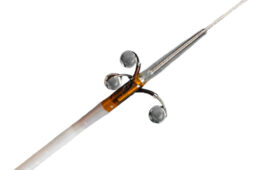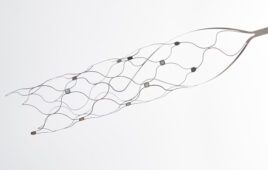
Yuan Chang [Photo courtesy of Porex]
The Porex Life Sciences Institute is a new business that brings unique integrated solutions to market to further the field of life sciences, including the innovative saliva collection device, Saletto™.
Born in northern China, Yuan moved to Atlanta to pursue her Ph.D. at Emory University, where she studied biomolecular chemistry with the application in biomedical engineering. Her research has been published in top journals, including the Journal of American Chemical Society (JACS) and Nature Methods.
After completing her Ph. D., Yuan worked in R&D for Alcon, a global medical device company, developing ocular health medical products. While there, she authored over 10 patents and patent applications.
She joined Porex Life Sciences Institute (PLSI) as one of the first team members in 2021.
What first drew you to medtech? When did you first know you wanted to be in the industry?
Chang: In college, I worked in medicinal chemistry as a student researcher. During that time, I was fascinated with how organic synthesis can turn simple small molecules into very complicated structures that can then function as therapeutic medicine. It amazed me that a drug could be made more effective with even the tiniest of chemical modifications. That is the moment I realized how research and advances in technology and engineering can indeed help save people’s lives and improve the quality of lives. When I discovered this passion, I determined that I wanted to pursue a career in the MedTech industry.
What are some of the barriers women face in today’s MedTech industry, if any?
Chang: Statistically, there is an imbalance in leadership positions in this industry in general.
Is there a perception problem that makes women less likely to pursue MedTech careers? If so, how can we change that?
Chang: There is still a perception that women do not typically go into engineering or medical technology. To overcome the bias, we need to raise more awareness and encourage more engagement with women in high schools and universities.
Describe your biggest challenge. How did you conquer it or resolve it?
Chang: The biggest challenge so far from my industry job experience was when I became pregnant and had to balance the physical and emotional demands of pregnancy with my work expectations. I found that the best way to overcome this was to find resources for support, including friends, family, and online resources and communities.
What is the most important lesson that has guided you in your career?
Chang: My most important lesson so far has been to learn from mentors. I feel very lucky that I have had several valuable mentors in my career who have unconditionally helped me, guided me, and empowered me. Furthermore, they were very honest and candid regarding career development and the potential challenges that I would face, and they provided invaluable advice through my training and beyond.
In your opinion, what more can be done to promote greater participation of young women in the MedTech industry today?
Chang: Narrow the gap in representation, leadership, compensation, and education.
What career advice would you give to your younger self?
Chang: Be brave. Believe in yourself and lean in.
Why is it important for companies to be more inclusive and have more women in medtech?
Chang: We need to create a world where equal opportunities exist for all. Women provide unique perspectives and backgrounds, and we should be able to channel that insight into producing products and services that are more applicable and relevant to the female demographic of our consumer base. Furthermore, having more women in the MedTech industry, and especially in positions of leadership, will inspire the younger generation of women brilliant minds and leaders.




